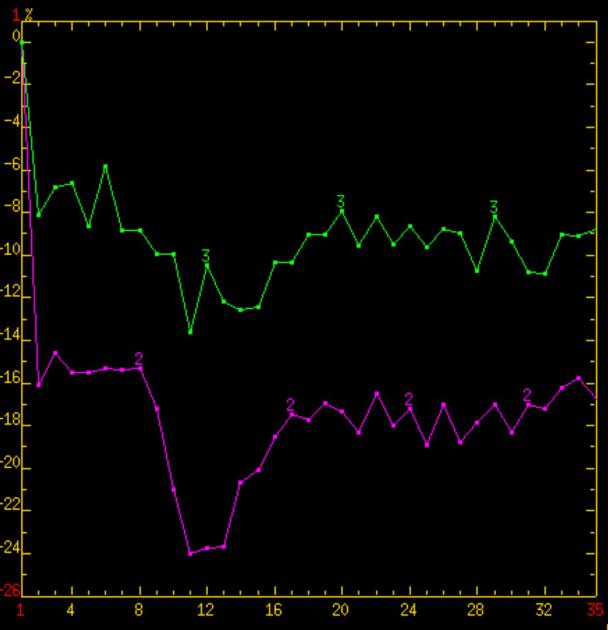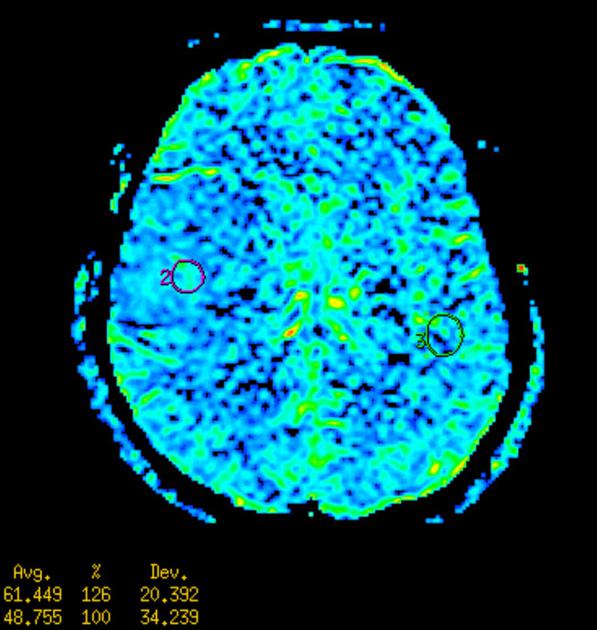Oligodendroglioma other imaging findings: Difference between revisions
Sara Mohsin (talk | contribs) |
Sara Mohsin (talk | contribs) |
||
| Line 25: | Line 25: | ||
===Magnetic Resonance Perfusion=== | ===Magnetic Resonance Perfusion=== | ||
*Findings on [[Perfusion weighted imaging|MR perfusion]] include:<ref name="Radio">Radiographic features of oligodendroglioma. Dr. Henry Knipe and Dr. Frank Gaillard et al. http://radiopaedia.org/articles/oligodendroglioma</ref><ref name="radiopaediamrp">Image courtesy of Dr. Frank Gaillard. Radiopaedia (original file [http://radiopaedia.org/cases/oligodendroglioma-2 here]). Creative Commons BY-SA-NC</ref> | *Findings on [[Perfusion weighted imaging|MR perfusion]] include:<ref name="Radio">Radiographic features of oligodendroglioma. Dr. Henry Knipe and Dr. Frank Gaillard et al. http://radiopaedia.org/articles/oligodendroglioma</ref><ref name="radiopaediamrp">Image courtesy of Dr. Frank Gaillard. Radiopaedia (original file [http://radiopaedia.org/cases/oligodendroglioma-2 here]). Creative Commons BY-SA-NC</ref> | ||
**Increased "''chicken wire''" network of vascularity, which results in elevated relative cerebral blood volume (rCBV) | **Increased "''chicken wire''" [[Network motif|network]] of [[vascularity]], which [[Result|results]] in elevated relative [[cerebral]] [[blood volume]] (rCBV) | ||
*MR perfusion has a sensitivity of 95% for distinguishing grade II from grade III oligodendrogliomas | *[[MR]] [[perfusion]] has a [[sensitivity]] of 95% for distinguishing [[Grading (tumors)|grade]] II from [[Grading (tumors)|grade]] III [[oligodendrogliomas]] | ||
*rCBV above the [[Threshold Limit Value|threshold]] of 1.75 demonstrates more rapid [[tumor]] progression | |||
{| | {| | ||
| | | | ||
| Line 35: | Line 36: | ||
===Positron Emission Tomography=== | ===Positron Emission Tomography=== | ||
*[[PET|11C-Methionine PET]] and [[PET|F-18 FDG PET]] studies can be used to differentiate oligodendroglioma from anaplastic oligodendroglioma<ref name="Radio">Radiographic features of oligodendroglioma. Dr. Henry Knipe and Dr. Frank Gaillard et al. http://radiopaedia.org/articles/oligodendroglioma</ref> | *[[PET|11C-Methionine PET]] and [[PET|F-18 FDG PET]] [[Study design|studies]] can be used to [[differentiate]] [[oligodendroglioma]] from [[anaplastic]] [[oligodendroglioma]]<ref name="Radio">Radiographic features of oligodendroglioma. Dr. Henry Knipe and Dr. Frank Gaillard et al. http://radiopaedia.org/articles/oligodendroglioma</ref> | ||
*[[PET|[18F] fluorodeoxyglucose PET]] scan has been helpful in:<ref name="Radio">Radiographic features of oligodendroglioma. Dr. Henry Knipe and Dr. Frank Gaillard et al. http://radiopaedia.org/articles/oligodendroglioma</ref><ref name="pmid16908552">{{cite journal| author=Ceyssens S, Van Laere K, de Groot T, Goffin J, Bormans G, Mortelmans L| title=[11C]methionine PET, histopathology, and survival in primary brain tumors and recurrence. | journal=AJNR Am J Neuroradiol | year= 2006 | volume= 27 | issue= 7 | pages= 1432-7 | pmid=16908552 | doi= | pmc= | url=http://www.ncbi.nlm.nih.gov/entrez/eutils/elink.fcgi?dbfrom=pubmed&tool=sumsearch.org/cite&retmode=ref&cmd=prlinks&id=16908552 }} </ref> | *[[PET|[18F] fluorodeoxyglucose PET]] [[scan]] has been helpful in:<ref name="Radio">Radiographic features of oligodendroglioma. Dr. Henry Knipe and Dr. Frank Gaillard et al. http://radiopaedia.org/articles/oligodendroglioma</ref><ref name="pmid16908552">{{cite journal| author=Ceyssens S, Van Laere K, de Groot T, Goffin J, Bormans G, Mortelmans L| title=[11C]methionine PET, histopathology, and survival in primary brain tumors and recurrence. | journal=AJNR Am J Neuroradiol | year= 2006 | volume= 27 | issue= 7 | pages= 1432-7 | pmid=16908552 | doi= | pmc= | url=http://www.ncbi.nlm.nih.gov/entrez/eutils/elink.fcgi?dbfrom=pubmed&tool=sumsearch.org/cite&retmode=ref&cmd=prlinks&id=16908552 }} </ref> | ||
** | **[[Differentiate|Differentiating]] [[oligodendroglioma]] from [[anaplastic|anaplastic oligodendroglioma]] - [[Florbetapir (18F)|[18F] fluorodeoxyglucose]] (FDG) uptake of [[oligodendroglioma]] is similar to normal [[white matter]], whereas [[FDG]] uptake of [[anaplastic|anaplastic oligodendroglioma]] is [[Similarity matrix|similar]] to normal [[gray matter]] | ||
**Differentiating [[tumor]] recurrence from tumor [[necrosis]] | **[[Differentiate|Differentiating]] [[tumor]] [[Recurrence plot|recurrence]] from [[tumor]] [[necrosis]] | ||
**Therapy response assessment | **[[Therapy]] [[Response element|response]] [[Assessment and Plan|assessment]] | ||
===Bone Scan=== | ===Bone Scan=== | ||
*Most malignant gliomas get metastasized to the bones via the hematogenous spread | *Most [[malignant]] [[gliomas]] get [[metastasized]] to the [[bones]] via the hematogenous [[Spread of the cancer|spread]]<ref name="pmid24212625">{{cite journal| author=Beauchesne P| title=Extra-neural metastases of malignant gliomas: myth or reality? | journal=Cancers (Basel) | year= 2011 | volume= 3 | issue= 1 | pages= 461-77 | pmid=24212625 | doi=10.3390/cancers3010461 | pmc=PMC3756372 | url=http://www.ncbi.nlm.nih.gov/entrez/eutils/elink.fcgi?dbfrom=pubmed&tool=sumsearch.org/cite&retmode=ref&cmd=prlinks&id=24212625 }} </ref> | ||
*[[Bone scan]] may be performed to detect metastases of malignant oligodendroglioma to [[bones]] | *[[Bone scan]] may be [[Performance status|performed]] to [[Detection theory|detect]] [[metastases]] of [[malignant]] [[oligodendroglioma]] to [[bones]]<ref name="pmid16219856">{{cite journal| author=Al-Ali F, Hendon AJ, Liepman MK, Wisniewski JL, Krinock MJ, Beckman K| title=Oligodendroglioma metastatic to bone marrow. | journal=AJNR Am J Neuroradiol | year= 2005 | volume= 26 | issue= 9 | pages= 2410-4 | pmid=16219856 | doi= | pmc= | url=http://www.ncbi.nlm.nih.gov/entrez/eutils/elink.fcgi?dbfrom=pubmed&tool=sumsearch.org/cite&retmode=ref&cmd=prlinks&id=16219856 }} </ref><ref name="pmid8580060">{{cite journal| author=Gerrard GE, Bond MG, Jack AS| title=Bone marrow infiltration by a parietal lobe grade III oligodendroglioma. | journal=Clin Oncol (R Coll Radiol) | year= 1995 | volume= 7 | issue= 5 | pages= 321-2 | pmid=8580060 | doi= | pmc= | url=http://www.ncbi.nlm.nih.gov/entrez/eutils/elink.fcgi?dbfrom=pubmed&tool=sumsearch.org/cite&retmode=ref&cmd=prlinks&id=8580060 }} </ref> | ||
==References== | ==References== | ||
Latest revision as of 23:59, 18 May 2019
Editor-In-Chief: C. Michael Gibson, M.S., M.D. [1]Associate Editor(s)-in-Chief: Sara Mohsin, M.D.[2]Sujit Routray, M.D. [3]
Overview
Other imaging studies for oligodendroglioma include MR spectroscopy (dominant N-acetyl aspartate peak, increased choline levels and decreased NAA levels with a myo-inositol peak), MRperfusion (increased "chicken wire" network of vascularity, which results in elevated relative cerebral blood volume), PET scan (to differentiate between oligodendroglioma from anaplasticoligodendroglioma and tumor recurrence from tumor necrosis), and bone scan (bone metastasis).
Other Imaging Findings
Other imaging studies for oligodendroglioma include following:
Magnetic Resonance Spectroscopy
|
Oligodendroglioma Microchapters |
|
Diagnosis |
|---|
|
Treatment |
|
Case Studies |
|
Oligodendroglioma other imaging findings On the Web |
|
American Roentgen Ray Society Images of Oligodendroglioma other imaging findings |
|
Risk calculators and risk factors for Oligodendroglioma other imaging findings |
- Findings on MR spectroscopy include:[1][2][3][4][5]
- N-acetyl aspartate (NAA) peak is dominant
- Choline-to-creatine ratio of less than 3:1
- Reduction of NAA/creatine ratio
- Increased choline levels and decreased NAA levels with a myo-inositol peak
- Increased glutamine and glutamate levels in low-grade oligodendroglioma in contrast to high-grade oligodendroglioma
- Increased lipid and lactate levels in high-grade oligodendroglioma in contrast to low-grade oligodendroglioma
 |
Magnetic Resonance Perfusion
- Findings on MR perfusion include:[6][7]
- Increased "chicken wire" network of vascularity, which results in elevated relative cerebral blood volume (rCBV)
- MR perfusion has a sensitivity of 95% for distinguishing grade II from grade III oligodendrogliomas
- rCBV above the threshold of 1.75 demonstrates more rapid tumor progression
 |
 |
Positron Emission Tomography
- 11C-Methionine PET and F-18 FDG PET studies can be used to differentiate oligodendroglioma from anaplastic oligodendroglioma[6]
- [18F] fluorodeoxyglucose PET scan has been helpful in:[6][8]
- Differentiating oligodendroglioma from anaplastic oligodendroglioma - [18F] fluorodeoxyglucose (FDG) uptake of oligodendroglioma is similar to normal white matter, whereas FDG uptake of anaplastic oligodendroglioma is similar to normal gray matter
- Differentiating tumor recurrence from tumor necrosis
- Therapy response assessment
Bone Scan
- Most malignant gliomas get metastasized to the bones via the hematogenous spread[9]
- Bone scan may be performed to detect metastases of malignant oligodendroglioma to bones[10][11]
References
- ↑ Eskandar EN, Loeffler JS, O'Neill AM, Hunter GJ, Louis DN (2004). "Case records of the Massachusetts General Hospital. Weekly clinicopathological exercises. Case 33-2004. A 34-year-old man with a seizure and a frontal-lobe brain lesion". N Engl J Med. 351 (18): 1875–82. doi:10.1056/NEJMcpc049025. PMID 15509821.
- ↑ Nikaido K, Nihira H, Wakai S, Honmo O, Tsuzuki A (2003). "[A case of oligodendroglioma with temporal lobe epilepsy initially suspected as having paroxymal tachycardia]". No To Hattatsu. 35 (5): 401–5. PMID 13677949.
- ↑ Axial MRS of oligodendroglioma. Dr. Bruno Di Muzio. Radiopaedia 2015. http://radiopaedia.org/cases/oligodendroglioma-14
- ↑ Rijpkema M, Schuuring J, van der Meulen Y, van der Graaf M, Bernsen H, Boerman R; et al. (2003). "Characterization of oligodendrogliomas using short echo time 1H MR spectroscopic imaging". NMR Biomed. 16 (1): 12–8. doi:10.1002/nbm.807. PMID 12577293.
- ↑ Image courtesy of Dr. Bruno Di Muzio. Radiopaedia (original file here). Creative Commons BY-SA-NC
- ↑ 6.0 6.1 6.2 Radiographic features of oligodendroglioma. Dr. Henry Knipe and Dr. Frank Gaillard et al. http://radiopaedia.org/articles/oligodendroglioma
- ↑ Image courtesy of Dr. Frank Gaillard. Radiopaedia (original file here). Creative Commons BY-SA-NC
- ↑ Ceyssens S, Van Laere K, de Groot T, Goffin J, Bormans G, Mortelmans L (2006). "[11C]methionine PET, histopathology, and survival in primary brain tumors and recurrence". AJNR Am J Neuroradiol. 27 (7): 1432–7. PMID 16908552.
- ↑ Beauchesne P (2011). "Extra-neural metastases of malignant gliomas: myth or reality?". Cancers (Basel). 3 (1): 461–77. doi:10.3390/cancers3010461. PMC 3756372. PMID 24212625.
- ↑ Al-Ali F, Hendon AJ, Liepman MK, Wisniewski JL, Krinock MJ, Beckman K (2005). "Oligodendroglioma metastatic to bone marrow". AJNR Am J Neuroradiol. 26 (9): 2410–4. PMID 16219856.
- ↑ Gerrard GE, Bond MG, Jack AS (1995). "Bone marrow infiltration by a parietal lobe grade III oligodendroglioma". Clin Oncol (R Coll Radiol). 7 (5): 321–2. PMID 8580060.